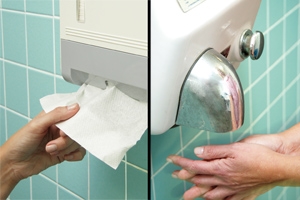Are paper towels less costly to your facility than running and maintaining a hand dryer? It’s a tricky question, especially if you are a tenant verses an owner.
The debate is usually based on carbon footprint and costs, but for infection control (hospital type environment ) hand dryers have a tendency to be less hygienic than paper towels. There have been experiments carried out and under ultra-violet light the spread of germs caused by the air-flow can be quite extensive.
But both methods have their benefits. Paper towel probably has a greater environmental impact than hand dryers especially when you consider papers towel’s production (water and energy consumption), packaging (energy consumption), transportation (fuel energy consumption) and storage (energy consumption). You should also consider the labor required to replenish the hand towel, removal of the waste from the bathroom, and then the disposal of the waste from site.
With government legislation requiring buildings to be energy rated, especially the new Local Law 87 in NYC which requires energy benchmarking, having hand towels installed means that as a tenant (typically) you won’t pay the electricity costs that would otherwise be passed on if you had hand dryers installed. Increased energy costs will obviously impact on either your tenancy or buildings rating performance.
A LinkedIn contributor conducted a trial and installed dryers vs. paper towel. While the dryers appeared to be the better solution (Dyson were the preferred choice), they observed a small increase in their energy costs. As they were looking to reduce overall energy consumption (and thus carbon footprint) to improve our energy rating, they are now considering staying with paper towel.
From a hygienic point of view, the paper towels are more effective as the paper is fresh and clean. The dryers recirculate air within the bathroom and are therefore not hygienic. Airbone fecal matter is recycled through the air intake, filtering through the filament and germinating until someone starts the dryer again where it is transferred onto your hands.
There are products on the market that are extremely cost effective and energy efficient such as the Dyson airblade which studies show will pay for itself within a 26 month period. They are extremely energy efficient and require little maintenance.
Paper towels can contribute to a significant amount of problems from people putting them into toilets and causing blockages needing to be cleared etc, along with this they are also a fairly costly item that are replenished on a highly regular basis.
The environment should dictate the equipment or facility used or be viewed in such a way as to cover all aspects of the situation and requirements.
Discover more from Helping NYC & Long Island Commercial Tenants, Owners, and Developers
Subscribe to get the latest posts sent to your email.






For me, I could say that having paper towel is more effective and efficient in the rest room. Having a hand dryer is fine but I think it’s so costly when it comes to electricity and also paper towel probably has a greater environmental impact than hand dryers especially when you consider papers towel’s production.
Impact Hygiene Services
http://impacthygiene.com.au/
We had been using C-Fold paper towels in the restrooms. The problems with C-Fold towels is the dispenser which usually dispenses more towels than needed and sometimes a large wad of towels is received to your dismay. These C-Fold dispensers have been replaced with large roll, automatic dispensing towel units which are activated by proximity. The janitorial company replaced the C-Fold with the automatic dispensers for free since the paper was easier to install, easier to maintain lasted longer and was less expensive than the C-Fold. The automatic proximity dispensers have the added advantage of no-touch on the dispenser which is more hygienic.
I would like to see some back up on the “fecal matter” argument.
The Dyson Airblade is indeed very popular. http://www.restroomdirect.com/dyson-airblade.aspx
Thank you for your feedback Christopher.
There are many sites like Discovery http://dsc.discovery.com/tv-shows/mythbusters/mythbusters-database/fecal-matter-on-toothbrush.htm that discuss airborne fecal matter. While this example examines airborne fecal matter on toothbrushes, the same has been found for dryers. One example is http://www.wikihow.com/Use-a-Public-Restroom where it states “Dry your hands using the dryer or paper provided. Some places use cloth towels that circulate in a dispenser – be sure to move the towel onto the next clean space, otherwise you will be wiping your hands on the previous person’s space. Note that hot-air dryers are less sanitary because bacteria fester and thrive in the hot, moist vents. Use paper towels, if possible.”
Based on the many instances mentioned, I felt confident there was enough evidence to include it in the article.
I hope this answers your question.
RN
OK, so the myth busters piece shows that there is a tiny amount of fecal matter everywhere. But it is a leap to assume that there is more fecal matter on the inside of a hand dryer than there is on a paper towel, or that one is more sanitary that the other. (A wet paper towel that ends up on a counter is surely worse.)
The “How to use a Public Restroom” piece is sponsored by Kimberly Clark which makes, you guessed it, paper towels. The whole piece is about using more toilet paper and paper towels. It makes the statement that bacteria festers in hand dryers, but it does not back this up with any studies and it does not mention how much bacteria can be found on paper towels.
There is so much paranoia about something that we all do every day. It is really amazing. I heard on NPR 2 days ago that one of the places with the least amount of fecal matter is actually the toilet seat. This is because it is a smooth surface that is constantly cleaned. The kitchen sponge actually has a far greater amount of fecal matter in it!
Interesting discussion.
No arguments here. You are correct in your statements.
Primarily the choice for me has been one of hygiene,dryers that have been notoriously ineffective and causing people to avoid them or only partially dry their hands. I have experience with the new Dyson dryers and have found them to be more effective but still prefer paper believing it to be the more hygienically effective. I’ve enjoyed seeing the arguments above and will add them to my considerations when next I have to make the decision.